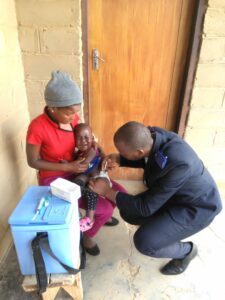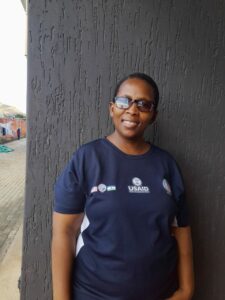World Immunization Week – A Voice from the Frontline
World Immunization Week falls every year during the last week of April. According to the World Health Organization (WHO), which spearheads this awareness-raising campaign: “The ultimate goal of World Immunization Week is for more people—and their communities—to be protected from vaccine-preventable diseases.”

m2m Nurse administering a vaccine in Lesotho
There are vaccines to prevent more than 20 life-threatening diseases, like diphtheria, tetanus, pertussis, influenza, and measles. Yet despite tremendous progress in increasing access to these vaccines in sub-Saharan Africa, WHO Africa says vaccine coverage has stagnated in many countries. Approximately one in five African children do not receive all the necessary and basic vaccines— resulting 30 million children under five suffering from vaccine-preventable diseases every year in Africa. Furthermore, over half a million children die of vaccine-preventable diseases in Africa, which is approximately 58% of the global rate.
As part of our commitment to ensure that every child stays healthy and thrives, mothers2mothers (m2m) leverages our strong, trusted relationships with families to help prevent and treat childhood illness. These services include educating families about the importance of childhood immunisations, and making referrals and following up to ensure infants and children receive the vaccines they need. In Lesotho, m2m-employed nurses even travel into communities in remote areas and administer vaccines themselves.
We recently asked m2m Nurse Matholoana Lenkoane about the challenges that families in Lesotho face in accessing vaccines for their children and how m2m is helping to improve vaccination rates in the communities they serve.
Q: What do you tell your clients about the importance of immunising their children?

m2m Nurse Matholoana Lenkoane
Matholoana: Immunisations are the simplest and most effective way of protecting children from serious childhood diseases such as measles. Vaccines help the child’s immune system fight against certain diseases so that when a child comes into contact with these diseases their immune system is able to respond more effectively, preventing the disease from developing. Immunisations save live because they help children fight the disease and reduce its severity.
They also protect the broader community by minimising the spread of disease. Therefore, I always encourage my clients to ensure that their children get all the necessary vaccines and tell my clients that they should motivate other caregivers to immunise their children. By doing that, their community can achieve “herd immunity” to prevent spread of preventable childhood diseases such as polio and save lives.
Q: What challenges do your clients face in getting their children immunised?
Matholoana: The challenges are often logistical. Lesotho has heavy rains which make it hard for clients to walk long distance to the health facilities to get their children vaccinated. Damaged foot bridges can also make it difficult to reach health facilities. Equally important, some clients don’t have money for transport to the health facilities to get immunisations due to poverty and the country’s high unemployment rates. Additionally, some children are cared for by elderly people who are not knowledgeable about immunisations.
Q: How do you help them overcome these challenges?
Matholoana: There are community outreach initiatives in Lesotho to reach clients who are unable to travel to health facilities. m2m nurse-led support groups reach clients who are living in communities where these outreach initiatives are not conducted. When m2m does these outreaches, we always carry cooler boxes with immunisations to cover the estimated number of children in that community. We also lead immunisation campaigns and mop-up whereby a mobile clinic can locate children who missed their immunisation. As m2m nurses, we do not work in silos. Wherever we go, we always have full support from the health centres we serve.
m2m nurses and Mentor Mothers also track children who missed their immunisations through phone calls, SMS, and home visits.
Q: How does it make you feel to be contributing to the health of children?
Matholoana: I love children therefore I enjoy contributing to the life and health of every child I come across. Being involved in immunisation programmes gives me the opportunity to assess a child’s health status by integrating immunisation with nutritional assessment, HIV exposure assessment as well as general assessments after which the caregiver will be educated about their child’s health and referred for additional health services as needed.
Q: What do you find most fulfilling about your job?
Matholoana: What I love most is providing safe immunisations for children by ensuring that a child gets vaccinated correctly to prevent an adverse reaction.
I also like ensuring that vaccines are stored at the right temperatures, because this can affect their potencies, and I work to prevent vaccine stock outs as this can demotivate clients to bring their children for immunisations.
Lastly, it is important that healthcare providers get regularly refreshers about children immunisations to ensure that children always get immunisations according to set standards. To make this happen, I do supportive supervision at each and every health facility and community our nurses are based at. I also do quarterly onsite trainings in every district to ensure that we follow the latest immunisation guidelines set by the government.






















